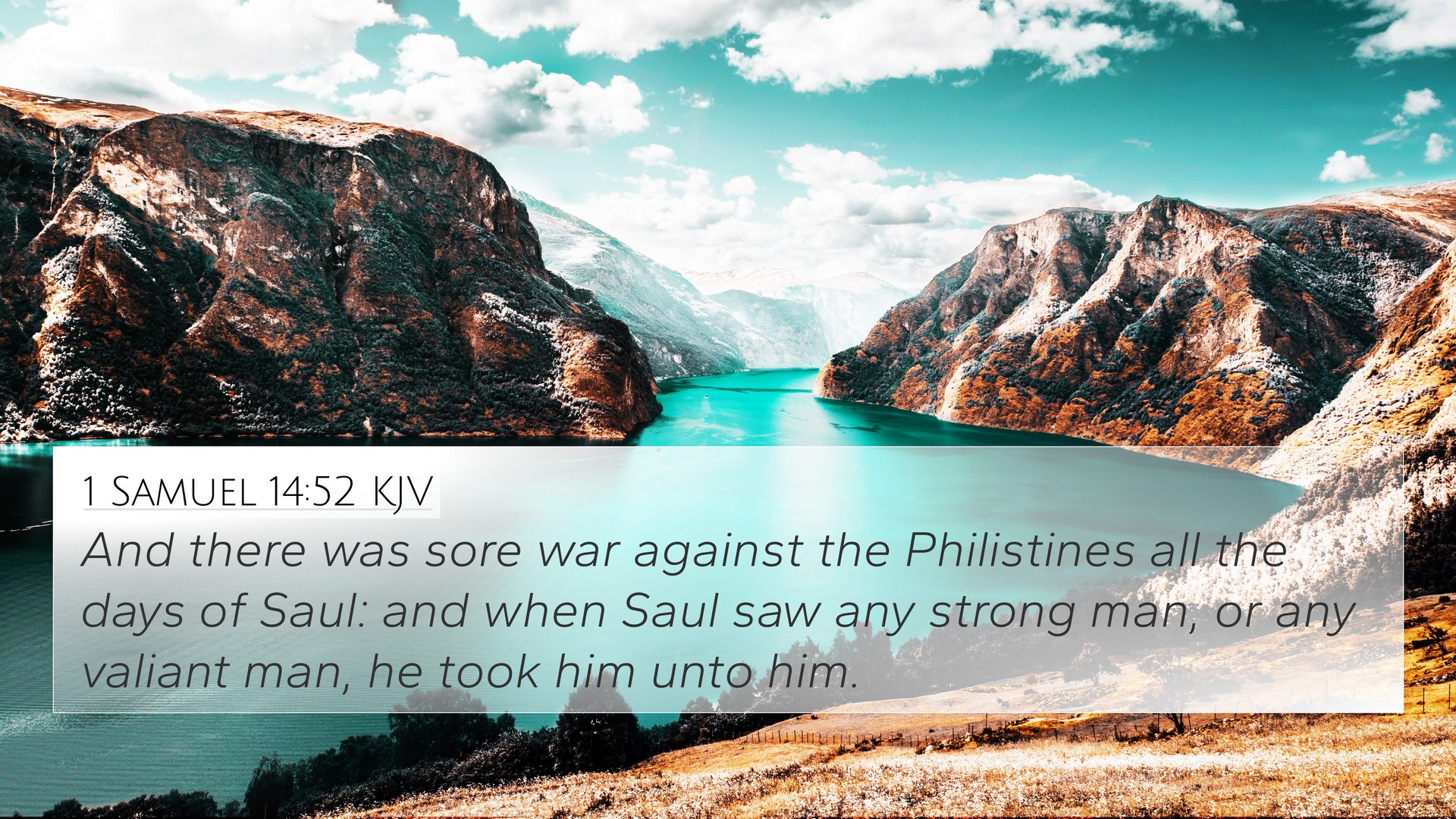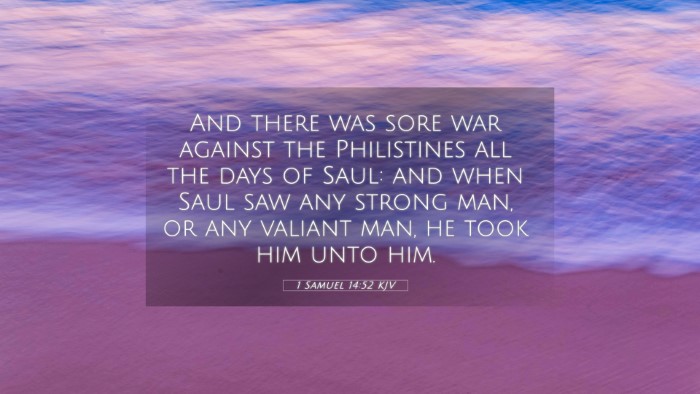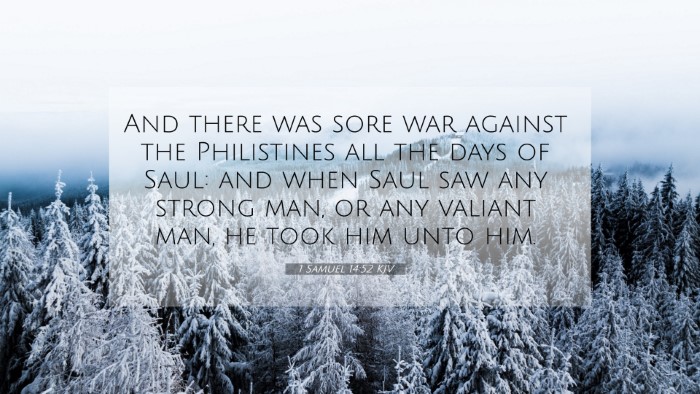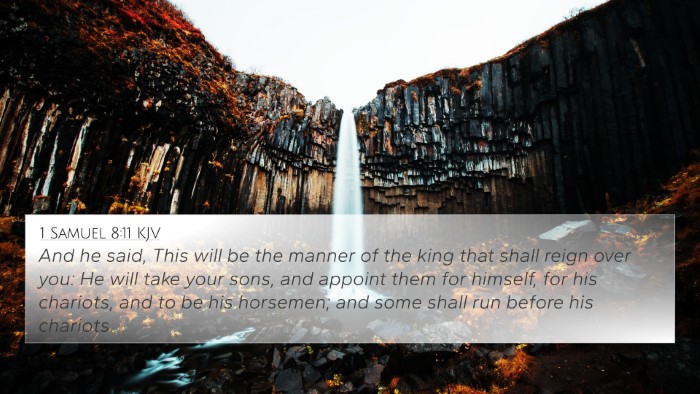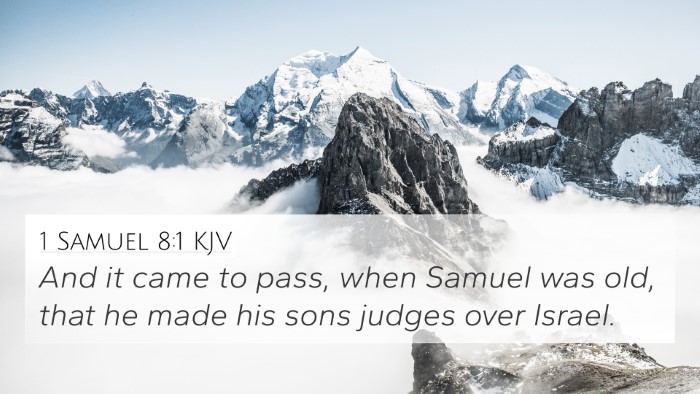Understanding 1 Samuel 14:52
This passage, which states, "And there was sore war against the Philistines all the days of Saul: and when Saul saw any strong man, or any valiant man, he took him unto him." (1 Samuel 14:52, KJV), highlights the ongoing conflict between Israel and the Philistines during the reign of King Saul. The verse can be interpreted through various public domain commentaries, each offering insights that shed light on its meaning.
Commentary Insights
- Matthew Henry Commentary:
Henry emphasizes the continuous warfare faced by Saul during his reign. The verse illustrates the idea that Saul, in a desperate bid to secure his kingdom, actively recruited strong and valiant men for his army. This creates a picture of a king committed to militaristic growth, which may reflect his insecurity about his rule and the challenges posed by external threats from the Philistines.
- Albert Barnes Commentary:
Barnes points out the practicality in Saul's decisions, noting that a strong military presence was vital for defense against the Philistines. His recruitment strategy illustrates not just leadership but also the need for contingency planning in a time of persistent threat. This verse could also be viewed as a foreshadowing of Saul’s reliance on human strength rather than divine support.
- Adam Clarke Commentary:
Clarke situates this verse within the broader narrative context, acknowledging the strain of constant warfare on Israelite society. The mention of "any strong man or valiant man" indicates Saul’s desire to consolidate power through might, while also indirectly highlighting the valor that was often celebrated in Hebrew culture. Clarke notes that this recruitment reflects an alignment between national crises and individual valor in the Israelite community.
Cross-References and Thematic Connections
1 Samuel 14:52 connects with various Bible verses that explore themes of strength, leadership, and reliance on God versus military power. Here are some pertinent cross-references:
- Exodus 15:3: "The LORD is a man of war: the LORD is his name." - This verse highlights God’s role in battles, suggesting that reliance on divine strength surpasses human capability.
- 1 Samuel 10:26: "And Saul also went home to Gibeah; and there went with him a band of men, whose hearts God had touched." - This indicates the initial support Saul had from God-fearing men.
- 1 Samuel 13:19-22: Discusses the Israelite predicament of lacking smiths during Saul’s reign, illustrating the hardships faced in preparation for war.
- 2 Chronicles 16:8: Details the reliance on human alliances and defenses, aligning with Saul's strategy in recruiting strong individuals.
- Psalm 20:7: "Some trust in chariots and some in horses, but we trust in the name of the LORD our God." - This reflects the contrast between human military might and divine trust.
- Proverbs 21:31: "The horse is made ready for the day of battle, but victory belongs to the LORD." - A similar theme emphasizing the futility of human efforts without God's intervention.
- Micah 5:9: Speaks to God’s care and protection over His people despite external threats.
- Isaiah 31:1: Condemns reliance on Egypt for help, promoting faith in God instead.
- 2 Samuel 23:8: Describes the "mighty men" of David, paralleling Saul’s gathering of strong individuals.
- Hebrews 11:32-34: Celebrates those of faith who through strength overcame obstacles, resonating with Saul’s military focus.
Conclusions and Application
The analysis of 1 Samuel 14:52 through various commentaries reveals the multidimensional aspects of Saul's leadership and the nature of warfare in ancient Israel. As we explore the connections between this verse and others, we gain insight into the biblical narrative that often juxtaposes human effort with divine intervention.
Tools for Further Study
For those interested in deeper comparative Bible verse analysis and cross-referencing biblical texts, the following resources can be beneficial:
- Bible Concordance: A comprehensive guide to finding specific terms and their occurrences throughout the Bible.
- Bible Cross-Reference Guide: Helpful for tracing thematic connections across different biblical books.
- Cross-Reference Bible Study: Methods for integrating cross-references into personal study or sermon preparation.
- Bible Reference Resources: Tools that assist in electronically or manually finding connections between verses.
- Comprehensive Bible Cross-Reference Materials: Guides that provide extensive networks of biblical verses that relate to various themes.
Finding and Using Cross-References
Understanding how to find cross-references in the Bible can significantly enrich your study. Identifying connections between the Old and New Testament fosters a more profound comprehension of scriptural context. Utilizing detailed cross-references between Gospels or comparing themes in Pauline epistles can reveal deeper insights.
Encouragement to Explore
In conclusion, the study of 1 Samuel 14:52 and its surrounding context encourages believers to reflect on themes of strength, leadership, and reliance on God. Exploring the vast network of cross-references enhances one’s understanding of scripture and enables a more comprehensive approach to Bible study.
